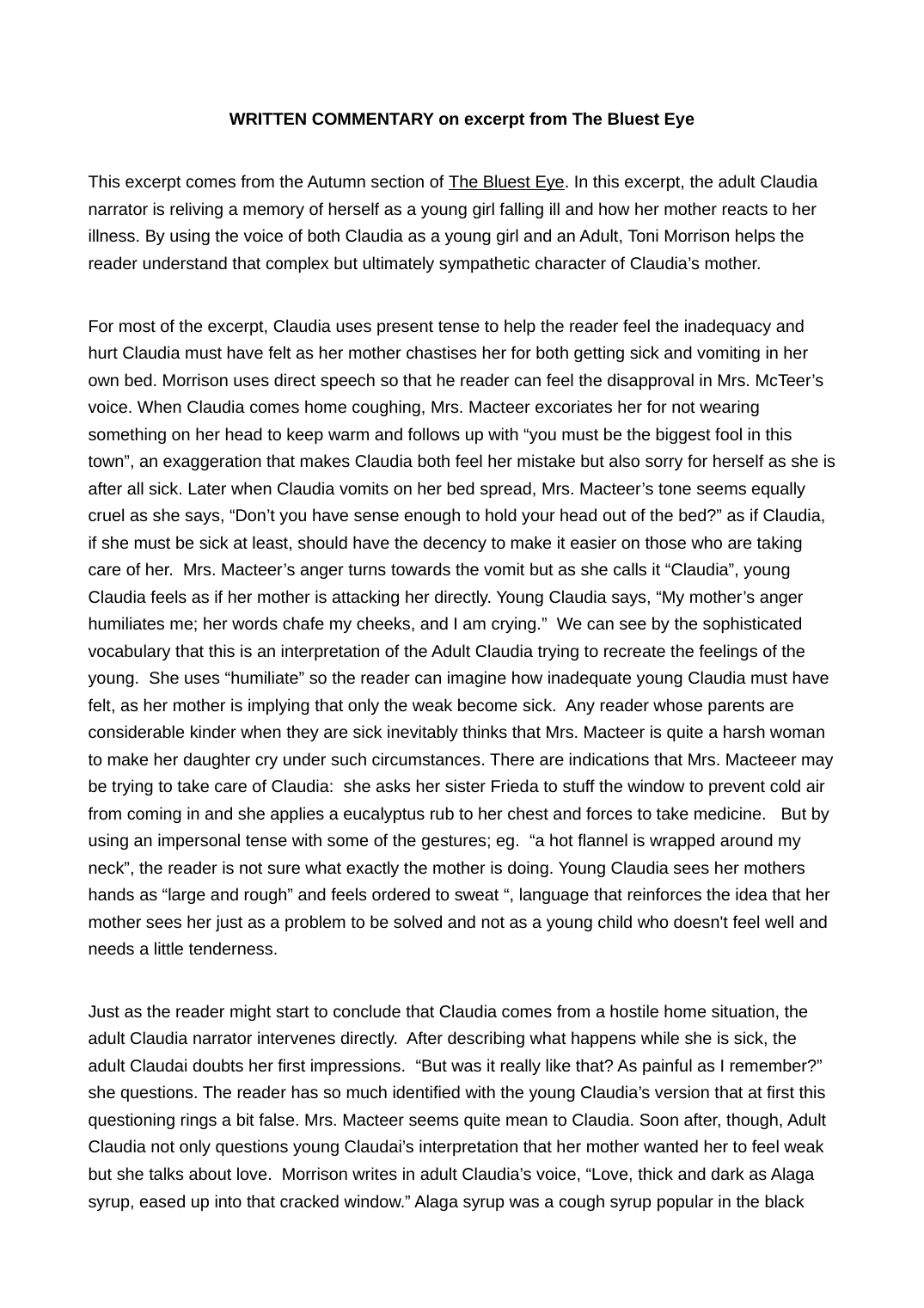commentary autumn the bluest eye
Publié le 15/01/2022
Extrait du document
«
WRITTEN COMMENTARY on excerpt from The Bluest Eye
This excerpt comes from the Autumn section of The Bluest Eye .
In this excerpt, the adult Claudia
narrator is reliving a memory of herself as a young girl falling ill and how her mother reacts to her
illness.
By using the voice of both Claudia as a young girl and an Adult, Toni Morrison helps the
reader understand that complex but ultimately sympathetic character of Claudia’s mother.
For most of the excerpt, Claudia uses present tense to help the reader feel the inadequacy and
hurt Claudia must have felt as her mother chastises her for both getting sick and vomiting in her
own bed.
Morrison uses direct speech so that he reader can feel the disapproval in Mrs.
McTeer’s
voice.
When Claudia comes home coughing, Mrs.
Macteer excoriates her for not wearing
something on her head to keep warm and follows up with “you must be the biggest fool in this
town”, an exaggeration that makes Claudia both feel her mistake but also sorry for herself as she is
after all sick.
Later when Claudia vomits on her bed spread, Mrs.
Macteer’s tone seems equally
cruel as she says, “Don’t you have sense enough to hold your head out of the bed?” as if Claudia,
if she must be sick at least, should have the decency to make it easier on those who are taking
care of her.
Mrs.
Macteer’s anger turns towards the vomit but as she calls it “Claudia”, young
Claudia feels as if her mother is attacking her directly.
Young Claudia says, “My mother’s anger
humiliates me; her words chafe my cheeks, and I am crying.” We can see by the sophisticated
vocabulary that this is an interpretation of the Adult Claudia trying to recreate the feelings of the
young.
She uses “humiliate” so the reader can imagine how inadequate young Claudia must have
felt, as her mother is implying that only the weak become sick.
Any reader whose parents are
considerable kinder when they are sick inevitably thinks that Mrs.
Macteer is quite a harsh woman
to make her daughter cry under such circumstances.
There are indications that Mrs.
Macteeer may
be trying to take care of Claudia: she asks her sister Frieda to stuff the window to prevent cold air
from coming in and she applies a eucalyptus rub to her chest and forces to take medicine.
But by
using an impersonal tense with some of the gestures; eg.
“a hot flannel is wrapped around my
neck”, the reader is not sure what exactly the mother is doing.
Young Claudia sees her mothers
hands as “large and rough” and feels ordered to sweat “, language that reinforces the idea that her
mother sees her just as a problem to be solved and not as a young child who doesn't feel well and
needs a little tenderness.
Just as the reader might start to conclude that Claudia comes from a hostile home situation, the
adult Claudia narrator intervenes directly.
After describing what happens while she is sick, the
adult Claudai doubts her first impressions.
“But was it really like that? As painful as I remember?”
she questions.
The reader has so much identified with the young Claudia’s version that at first this
questioning rings a bit false.
Mrs.
Macteer seems quite mean to Claudia.
Soon after, though, Adult
Claudia not only questions young Claudai’s interpretation that her mother wanted her to feel weak
but she talks about love.
Morrison writes in adult Claudia’s voice, “Love, thick and dark as Alaga
syrup, eased up into that cracked window.” Alaga syrup was a cough syrup popular in the black.
»
↓↓↓ APERÇU DU DOCUMENT ↓↓↓
Liens utiles
- Hanif Kureishi - The Buddha of Suburbia
- does the end justifies the means
- the handmaid's tale: How far do you agree that Margaret Atwood makes resistance central to THT?
- La surprise au cinéma - Critique The King of Staten Island et Annette
- The danger of space exploration on the human body and the environment


